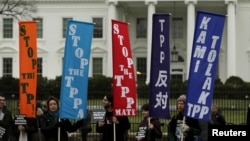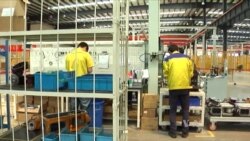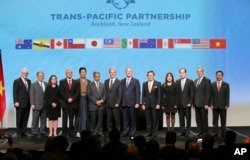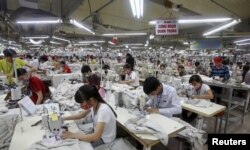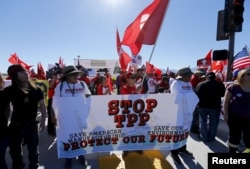It's one of the big questions in the 2016 U.S. presidential race: To trade or not to trade? And interestingly enough, it's one of the few economic issues both Republican and Democratic candidates seem to agree on. But what do economists have to say?
To hear Republican candidate Donald Trump put it, countries like China and Mexico have taken advantage of America's generosity and poor negotiating skills to hijack U.S. jobs.
"We have to renegotiate our trade deals and we have to stop these countries from stealing our companies and our jobs," he said.
Trump blames trade deals such as NAFTA — the 1994 North American Free Trade Agareement — for eliminating millions of American manufacturing jobs, calling it "the single worst trade deal ever approved."
TPP controversy
If elected, he promises to scuttle the pending Trans-Pacific Partnership, or TPP, a wide-ranging pact with Pacific Rim countries that Democratic candidate Hillary Clinton once described as the "gold standard" of trade deals. But that was when Clinton was still secretary of state, and before free trade became a toxic issue during her primary contest with Vermont Senator Bernie Sanders.
"The facts are, I did say I hoped it would be a good deal. But when it was negotiated, which I was not responsible for, I concluded it wasn't," Clinton said during the first debate.
The TPP negotiations, which were finalized earlier this year, would create one of the largest free-trade zones involving 12 Pacific nations that represent nearly 40 percent of the world's GDP.
Labor groups have been among the most fervent trade rejectionists. The AFL-CIO, the largest labor union in the U.S., warns that TPP, like NAFTA, is a job killer. AFL-CIO president Richard Trumka expects further job losses as American companies move to nations where labor costs are cheaper.
"TPP is not a trade deal," Trumka said, "but an outsourcing deal."
Threat of protectionism
However, economists say trade is not a zero-sum game. A recent survey by the nonpartisan National Association for Business Economics (NABE) shows that 47 percent of business economists believe TPP would create more winners than losers and should be adopted in its current form. NABE spokesman LaVaughn Henry said another 30 percent want a further review.
"So what that fundamentally means is: three out of four of the 414 survey respondents are saying move forward with trade on an adjusted basis. Don't throw out what works," he said.
And that is precisely what many fear. World Bank president Jim Yong Kim worries the protectionist mood among voters could further hurt the slowing global economy.
"These are not ordinary times," he said. "When we were at the G-20 meetings, we heard many world leaders really sound the alarm about the storm clouds of isolationism, protectionism, and they were very worried, every single one of them."
Job losses
Those storm clouds attributed to global trade have grown more consequential since China's entry into the World Trade Organization in 2000. Cheaper labor costs and the surge of Chinese goods have been blamed for the loss of an estimated 5 million manufacturing jobs in the U.S. in the following decade. On the other hand, China's entry into the WTO also added a billion more consumers to the global marketplace.
Many American farmers believe lower tariffs for Pacific Rim countries will increase U.S. food exports by more than $5 billion. But reducing tariffs might hurt U.S. automakers, who could face increased competition from Japanese carmakers.
The International Monetary Fund credits expanded global trade for raising living standards worldwide. But the Brookings Institution's William Galston says anti-trade sentiments are likely to persist because the U.S. has done little to help displaced workers.
"That has been the critical policy failure in the past 25 years — that policymakers have known in the abstract that there would be losers," Galston said. "But the assumption was that the economy was dynamic enough and flexible enough and big enough and diverse enough to absorb the people who had been displaced by trade."
Others say trade is often blamed unfairly.
"Trade is actually a relatively minor cause of job losses," said Roberto Azevedo, director general of the World Trade Organization. "The evidence shows that well over 80 percent — eight in 10 — of job losses in advanced economies are not due to imports or to trade but through increased productivity through technology and innovation."
U.S. President Barack Obama has enlisted business leaders to convince lawmakers to pass his signature trade legislation before he leaves the White House in January. Despite opposition from both sides of the political spectrum, Obama insists expanded trade, lower tariffs and a level playing field ensures the U.S. can remain competitive around the world for years to come.




